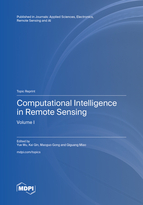Topic Menu
► Topic MenuTopic Editors




Computational Intelligence in Remote Sensing

A printed edition is available here.
Topic Information
Dear Colleagues,
With the development of earth-observation techniques, huge amounts of remote sensing data with a high spectral–spatial–temporal resolution are captured all the time, and remote sensing data processing and analysis have been successfully used in numerous fields, including geography, environmental monitoring, land survey, disaster management, mineral exploration, etc. They also have military, intelligence, commercial, economic, planning, and humanitarian applications, among others. For the processing, analysis and application of remote sensing data, there are many challenges, such as the huge amount of data, complex data structures, small labeled samples and nonconvex optimization. Computational intelligence techniques, which are inspired by biological intelligent systems, can provide possible solutions to the above-mentioned problems.
Computational intelligence (CI) is the theory, design, application, and development of biologically and linguistically motivated computational paradigms. Traditionally, the three main pillars of CI have been neural networks, fuzzy systems, and evolutionary computation. However, in time, many nature-inspired computing paradigms have evolved. Thus, CI is an evolving field, and at present, in addition to the three main constituents, it encompasses computing paradigms such as ambient intelligence, artificial life, cultural learning, artificial endocrine networks, social reasoning, and artificial hormone networks. CI plays a major role in developing successful intelligent systems, including games and cognitive developmental systems. Over the last few years, there has been an explosion of research on deep learning, specifically deep convolutional neural networks, and deep learning has become the core method for artificial intelligence. In fact, some of the most successful AI systems today are based on CI. In the future, CI will produce effective solutions to the challenges in remote sensing.
This Topic aims to provide a forum for disseminating the achievements related to the research and applications of computational intelligence techniques for remote sensing (e.g., multi-/hyper-spectral, SAR and LIDAR) analysis and applications, with topics including but not limited to:
- Neural networks in remote sensing;
- Evolutionary computation in remote sensing;
- Fuzzy logic and systems in remote sensing;
- Artificial intelligence in remote sensing;
- Machine learning in remote sensing;
- Deep learning in remote sensing;
- Earth observation big data intelligence;
- Remote sensing image analysis;
- Remote sensing imagery.
Dr. Yue Wu
Prof. Dr. Kai Qin
Prof. Dr. Maoguo Gong
Prof. Dr. Qiguang Miao
Topic Editors
Keywords
- artificial intelligence
- machine learning
- deep learning
- neural networks
- computer vision
- image processing
- remote sensing
- multi-/hyper-spectral
- synthetic aperture radar
- LIDAR
- evolutionary computation
- fuzzy logic and systems
- earth observation big data intelligence
- remote sensing image analysis
- remote sensing imagery, etc.
Participating Journals
| Journal Name | Impact Factor | CiteScore | Launched Year | First Decision (median) | APC |
|---|---|---|---|---|---|

Applied Sciences
|
2.7 | 4.5 | 2011 | 16.9 Days | CHF 2400 |

Electronics
|
2.9 | 4.7 | 2012 | 15.6 Days | CHF 2400 |

Mathematics
|
2.4 | 3.5 | 2013 | 16.9 Days | CHF 2600 |

Remote Sensing
|
5.0 | 7.9 | 2009 | 23 Days | CHF 2700 |

Algorithms
|
2.3 | 3.7 | 2008 | 15 Days | CHF 1600 |

AI
|
- | - | 2020 | 20.8 Days | CHF 1600 |

MDPI Topics is cooperating with Preprints.org and has built a direct connection between MDPI journals and Preprints.org. Authors are encouraged to enjoy the benefits by posting a preprint at Preprints.org prior to publication:
- Immediately share your ideas ahead of publication and establish your research priority;
- Protect your idea from being stolen with this time-stamped preprint article;
- Enhance the exposure and impact of your research;
- Receive feedback from your peers in advance;
- Have it indexed in Web of Science (Preprint Citation Index), Google Scholar, Crossref, SHARE, PrePubMed, Scilit and Europe PMC.

